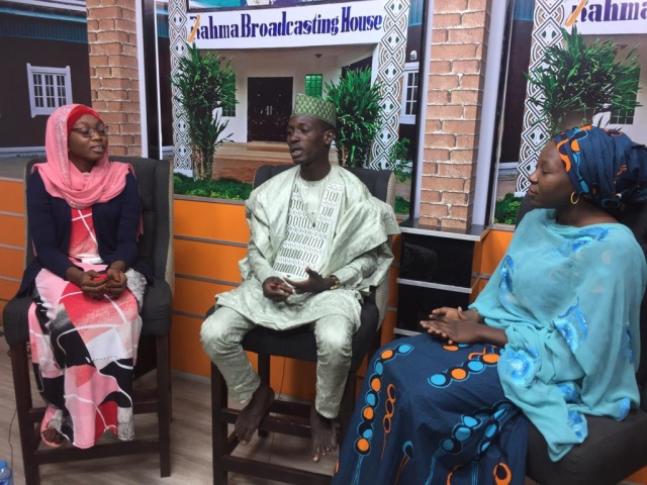
Nigeria-based Take Back the Tech! campaigner Centre for Information Technology and Development (CITAD) organised a number of activities, both online and offline, for the latest campaign, including workshops for young women in secondary schools and radio and television segments on digital rights and risks online. They even developed a lexicon for online gender-based violence. We caught up with CITAD Programme Assistant Maryam Ado Haruna about the campaign highlights and evolving public conversation around violence online in Nigeria.
Take Back the Tech: One of CITAD's main activities during the 16 days was a series of workshops and outreach activities at secondary schools in the area to raise awareness about online gender-based violence and the need to create safer online spaces for young girls in Nigeria. Can you tell us more about these presentations?
Maryam Ado Haruna: The goal of the outreach was for female students in secondary schools to have an adequate understanding of the concept of online gender-based violence (GBV) as well as its effects and prevalence in Nigeria. It was also meant to help students know how to respond to online GBV when it occurs or is likely to happen by better protecting themselves from victimisation online. In the presentations, students were told about the need to safeguard their online accounts and all other online behaviours. Online safety and security tools were presented to them.
The presentations were divided into different sessions. The first presentation focused on understanding online GBV and the second on online safety and security tools.
TBTT: What kind of questions did the girls ask?
MAH: In Abuja, some of the comments and questions included:
-
"How can we reduce this online violence against women and girls?”
-
"We need you to encourage our parents on the importance of the internet to us.”
-
“Please guide us more on how to make positive use of our phones and not just for chatting.“
In Kano, most questions were asked in the local language as students were less confident of their English. Here are some of their questions:
-
"Why is it that girls have to face this serious challenge of GBV online?"
-
"My dad didn't want me to use social media because according to him, it will expose me to a lot of immoralities. He used to say the internet isn't important to me at all."
-
"I use social media such as Facebook and WhatsApp, so many times, some guys would want me to be having dirty chat but I don’t want to. How do I protect myself from them?"
-
"This presentation is really important to us, especially us girls who are vulnerable to such things. I hope myself and other girls around will utilise what we have heard here effectively."
The engagement exhibited by the students from the beginning of the presentations to the end showed their interest in the topic. Some of them expressed that they would adopt the tools they learnt from the workshops and utilise the internet for self-empowerment as well as teach the lessons they had learnt to other girls who could not attend: "This presentation is really important to us especially as we girls are vulnerable to such things. I hope myself and other girls will utilise what we have heard here effectively.” This was the nature of outreach across the four schools we visited.
TBTT: Why do you think this kind of education is so essential for young people and students? What are some of the common issues facing Nigerian youth when it comes to gender norms and gender based violence online?
MAH: The usage and influence of social media among students of secondary and even tertiary schools is so visible in our society. Most of these students are provided with these devices without any orientation on how to use them or training around online protection tools to prevent cybercrime and online GBV. Most of them use [these devices] only for entertainment, especially chats and games. This has made so many girls victims of gender based violence online since they do not know how to protect themselves. Similarly, many boys or young men have become perpetrators of online GBV without understanding its negative impacts on girls and even society at large. Some of them perpetrate GBV subconsciously.
Women in Nigeria, especially in northern Nigeria, are also expected to appear less online. This has made so many men and boys jeopardise women or girls who have an online presence, especially those in the public domain. Thus, many gendered hate speeches and other forms of online violence are perpetrated against women and girls in Nigeria. These have been the gender norms online in Nigeria for a very long time. This therefore demands and calls for more sensitisation and education of both young male and female Nigerians, especially students, on the concept of online GBV, the harm it can cause and how to counter it.
Our understanding of the issue is based on findings from various research projects carried out by CITAD.
Read the full interview here.